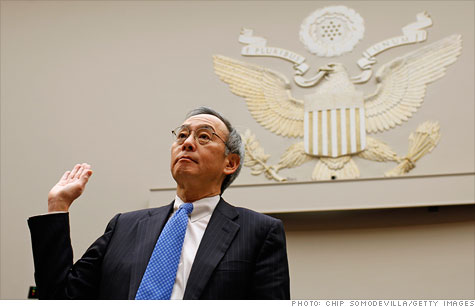Search News

Energy Secretary Steven Chu at a House hearing Thursday on the Solyndra bankruptcy.
NEW YORK (CNNMoney) -- Energy Secretary Steven Chu made no apologies Thursday for the $535 million loan guarantee the government made to now bankrupt solar panel maker Solyndra, saying the company's collapse was unforeseeable and politics did not play a role in the approval process.
Chu defended the administration at a hearing on Capitol Hill against republican attacks that the Obama administration awarded the loan guarantee because one of the company's main investors was a major fundraiser for Obama's presidential campaign in 2008.
"It is readily apparent that senior officials in the administration put politics before the good stewardship of taxpayer dollars," Florida Republican Rep. Cliff Stearns said in opening remarks. "Why did the DOE make these bad decisions? What can we do to prevent a waste of taxpayer dollars in the future?"
Chu said that DOE did not bend the rules for anyone.
"Over the course of Solyndra's loan guarantee, I did not make any decision based on political considerations," Chu said. "My decision to guarantee a loan to Solyndra was based on the analysis of experienced professionals and on the strength of the information they had available to them at the time."
Michigan Republican Fred Upton wanted to know who was to blame for the loss of taxpayer money.
"Was there incompetence or any influence of a political nature," asked Chu. "I'd have to say no."
"So no apology," asked Upton.
"It's extremely unfortunate what happened, but the bottom fell out of the market; it was totally unexpected," said Chu, referring to the collapse in the price for solar panels. "Fundamentally, this company and several others got caught in a bad tsunami."
Solyndra, once the administration's poster child for green job creation, filed for bankruptcy last summer after its innovative but expensive solar panels could not compete with Chinese imports that rapidly fell in price.
Congressional Republicans have been conducting a months-long investigation into the Solyndra loan process.
In addition to awarding the loan in the first place, they also say the administration improperly restructured it in 2010, giving private investors the right to get $75 million of their money back before the government, even though DOE knew of major problems at the firm.
"Were you aware that (a Treasury official) said that in his 28 years he has never seen taxpayer loans subordinated to private interests," asked Sterns.
Chu said he was not, but he believed the restructuring of the loan was legal and necessary as a last-ditch effort to turn the company around.
That didn't sit well with even some of the Democrats on the panel.
"When I voted for the loan program, I never thought taxpayer money would be subordinated," said Texas Democrat Gene Green.
Other lawmakers wanted to know why the DOE continued to give Solyndra money after it became clear the company was in trouble.
Chu said the company would have surely gone bankrupt without the money and they were hoping for a turnaround.
It's been noted by the Energy Department's own inspector general's office that the department has had trouble both dispersing and monitoring the billions it received under the stimulus program -- money that essentially doubled its budget.
Rumors are swirling around Washington that Chu, a Nobel Prize-winning physicist, may resign or be pushed out amid the political turmoil. The DOE denies those rumors.
One lawmaker asked about reports that someone at DOE pressured Solyndra to wait until after the 2010 elections to announce layoffs at the company.
Chu said it was not him, but that was aware of those allegations and that the department is looking into it.
Other Democrats on the panel rallied to Chu's defense.
"It's clear what's going on in this room," said California Democrat Henry Waxman. "House Republicans and their coal and oil industry allies are trying to manufacture a scandal...to delay the development of clean energy technologies that could compete with oil and coal."
Despite Solyndra's failure, Chu defended the loan guarantee program in general, which has backed nearly $36-billion in loans to companies working on breakthrough technologies that move the country away from fossil fuels.
"While we are disappointed in the outcome of this particular loan, we support Congress' mandate to finance the deployment of innovative technologies, and believe that our portfolio of loans does so responsibly," said Chu. "In the coming decades, the clean energy sector is expected to grow by hundreds of billions of dollars. We are in a fierce global race to capture this market."
But critics of the loan program say the Solyndra case, as well as another DOE-backed company that went bankrupt last month, is a prime example of why the government should not be supporting companies in the private sector.
Supporters of the program say government assistance for private companies happens all the time, and that renewable companies are being singled out for ideological reasons.
The DOE loan program for renewable technologies is now over, but it continues for electric car technology and nuclear power.
Congress has set aside around $10 billion to cover any loses from the $36 billion in loans the government has backed. Just a fraction of the $10 billion has been needed so far. ![]()